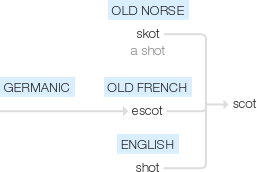Scot
late Old English, from Old Norse skot ‘a shot’, reinforced by Old French escot, of Germanic origin; related to shot1.
wiktionary
From Middle English scot, scott, from Old English scot, scott, sċeot, ġescot(“contribution; payment; tax; fine”), from Old Norse skot, from Proto-Germanic *skutą(“that which is thrown or cast; projectile; missile”), related to English shoot. Later influenced by Old French escot (Modern écot), itself of Germanic origin. More at shot.
etymonline
Scot (n.)
Old English Scottas (plural) "inhabitants of Ireland, Irishmen," from Late Latin Scotti (c. 400), of uncertain origin, perhaps from Celtic (but answering to no known tribal name; Irish Scots appears to be a Latin borrowing). The name followed the Irish tribe which invaded Scotland 6c. C.E. after the Romans withdrew from Britain, and after the time of Alfred the Great the Old English word described only the Irish who had settled in the northwest of Britain.
